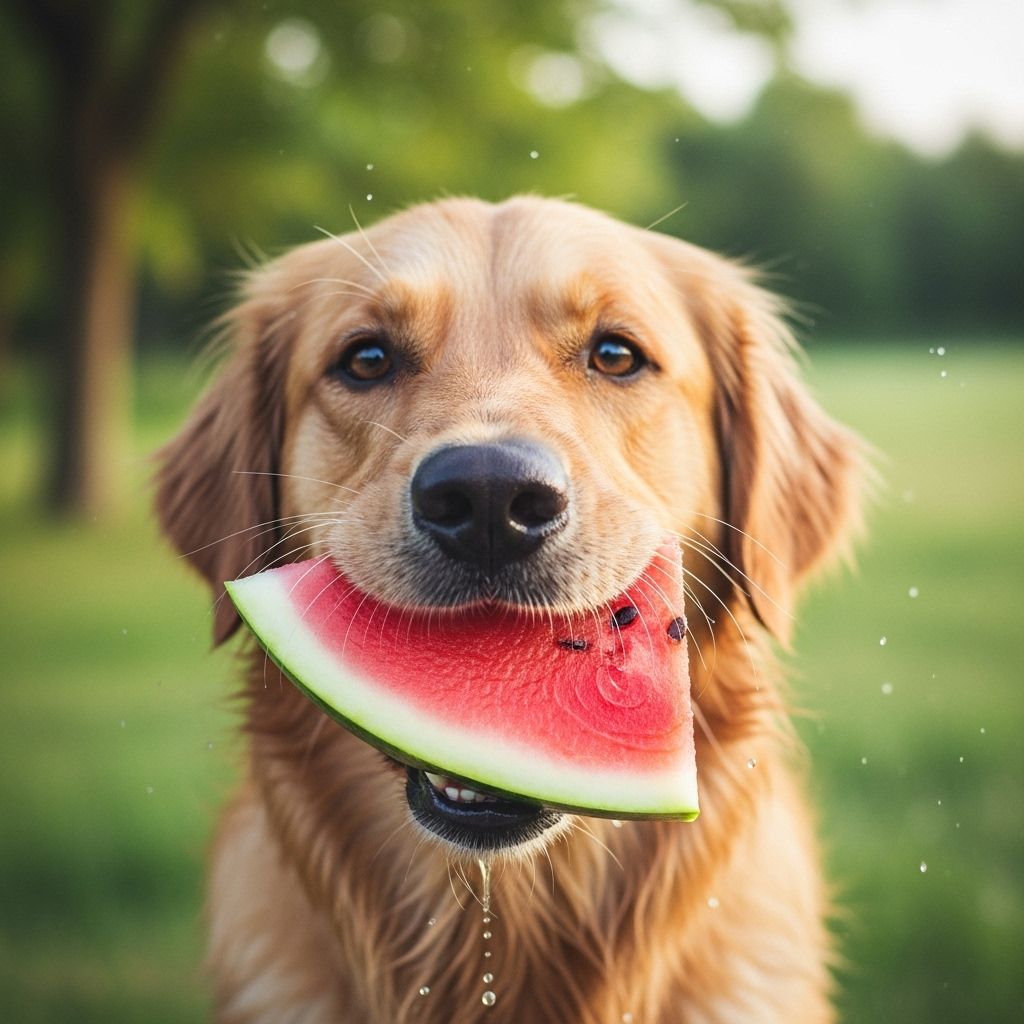Can Dogs Eat Watermelon? A Complete Guide for Pet Owners
Keep treats seed- and rind-free to boost your pup’s hydration and avoid digestive upset.

Watermelon is a symbol of summer—juicy, refreshing, and loved by many. If you’re a dog owner, you may have wondered: Can dogs eat watermelon? The short answer is yes, with some important caveats. In this comprehensive guide, discover the full details on feeding watermelon to dogs, including nutritional benefits, potential risks, and safe serving tips so you can share this delicious fruit with your furry friend safely and confidently.
Is Watermelon Safe for Dogs?
Watermelon flesh is safe for most dogs to eat in moderation, but some precautions are essential. Not all parts of the watermelon are suitable for your pet, and some dogs may have special health considerations that make watermelon inadvisable for them.
- Safe: The flesh—pink or red, seedless or seeds removed—is generally safe and non-toxic for dogs.
- Unsafe: The rind and seeds can pose hazards such as gastrointestinal upset or intestinal blockage and should be completely avoided.
Always consult your veterinarian before introducing new foods, especially if your dog has an underlying condition such as diabetes or allergies. Introduce watermelon slowly and monitor for any signs of intolerance, such as vomiting, diarrhea, or itching.
Nutritional Benefits of Watermelon for Dogs
Watermelon is more than a refreshing snack: it is packed with nutrients and hydration benefits for your dog. Here’s a closer look at the reasons you might want to share a slice with your pup on a hot day:
- High Water Content: About 92% water, watermelon is a natural source of hydration for dogs, especially in the summer months.
- Low Calories and Fat: Watermelon is low in calories (about 46–50 calories per cup) and contains no fat or cholesterol, making it a guilt-free snack.
- Vitamins: Rich in vitamins A, B6, and C.
- Vitamin A: Supports vision, immune system, and cellular function.
- Vitamin B6: Important for brain development and immune function.
- Vitamin C: An antioxidant helping to block free radicals and support the immune system.
- Minerals: Contains potassium and magnesium, which are important for heart health and muscle function.
- Lycopene: Watermelon’s red color is due to lycopene, an antioxidant that may help protect cells and support heart health.
- Fiber: Helps aid healthy digestion and prevents constipation.
- L-citrulline: An amino acid that aids muscle soreness recovery and may improve blood flow.
With these benefits, watermelon can be a healthy alternative to processed dog treats, as long as it is served appropriately.
Potential Risks: What Parts of Watermelon Should Dogs Avoid?
Before serving watermelon to your dog, there are some important safety cautions to keep in mind:
- Seeds: Both black and white seeds can cause intestinal blockage, especially in small dogs or puppies. Remove all seeds before offering watermelon.
- Rind: The thick, tough outer rind of the watermelon is not digestible for dogs and can lead to choking, gastrointestinal upset, or blockage.
- Quantity: Too much watermelon can cause digestive issues such as diarrhea due to its high water and fiber contents.
- Allergies and Sensitivities: Rare, but dogs can be allergic. Watch for adverse reactions such as vomiting, itching, or swelling after consumption.
- High Sugar Content: While natural, sugar can still be problematic for diabetic dogs. Consult your vet if your pet is diabetic or overweight.
| Part of Watermelon | Is It Safe for Dogs? | Potential Risk |
|---|---|---|
| Flesh (pink/red part) | Yes, in moderation | Digestive upset if over-consumed |
| Seeds (black or white) | No | Choking, intestinal blockage |
| Rind (green outer skin) | No | Gastrointestinal blockage, choking |
How to Safely Feed Watermelon to Your Dog
Feeding watermelon to your dog is simple, as long as you follow these preparation and serving guidelines:
- Wash the Watermelon: Rinse the outside thoroughly to remove chemicals or bacteria from the rind.
- Remove the Rind and Seeds: Cut away the outer rind and meticulously pick out all seeds—both black and white.
- Cut into Small Chunks: Serve the watermelon in bite-sized cubes to reduce choking risk, especially for small dogs.
- Moderation is Key: Treat watermelon as an occasional snack, not a meal replacement. Treats should make up no more than 10% of your dog’s daily calorie intake.
- Watch for Reactions: Give a small piece at first and observe your dog for any signs of food intolerance or allergies.
Get creative with serving, while sticking to these basics for safety and nutritional balance.
Fun and Safe Ways to Give Your Dog Watermelon
- Fresh Chunks: Simple cubes are easy, refreshing treats.
- Frozen Watermelon: Freeze seedless cubes for a cool summer treat and a fun chew for your pup.
- Puréed: Blend the flesh for an easy-to-lick summer snack, or pour into silicone molds and freeze for homemade pupsicles.
- Watermelon ‘Ice Cream’: Blend frozen watermelon with plain, unsweetened yogurt (no xylitol or artificial sweeteners) for a creamy, dog-safe dessert. Great for dogs not allergic to dairy.
- Stuffed Treats: Mix pureed watermelon with dog-safe fruits and stuff into toys like KONGs, then freeze for mental stimulation and fun.
Signs of Watermelon Allergy or Sensitivity in Dogs
Most dogs tolerate watermelon well, but it’s important to watch for any signs of intolerance or allergy, especially the first time you give this fruit. Symptoms to look out for include:
- Vomiting
- Diarrhea
- Excessive scratching or itching
- Swelling of the face, ears, or lips
- Difficulty breathing (seek emergency vet care immediately)
If your dog shows any of these symptoms, discontinue watermelon and consult your vet.
Frequently Asked Questions (FAQs)
Can all dogs eat watermelon?
Most healthy dogs can safely eat seedless watermelon in moderation. However, dogs with diabetes, obesity, digestive sensitivities, or watermelon allergies should avoid it. Always check with your veterinarian before introducing a new treat to your dog’s diet.
What happens if my dog eats watermelon seeds or rind?
Consumption of seeds could lead to an intestinal blockage, especially in small dogs. If your dog swallows a seed or small piece of rind accidentally, monitor closely for signs of distress—vomiting, lack of appetite, constipation, or abdominal pain. Seek veterinary care if any of these symptoms occur.
How much watermelon can I give my dog?
No more than 10% of your dog’s daily calorie intake should come from treats, including fruits like watermelon. For most dogs, a few small cubes is plenty as an occasional treat.
Can puppies eat watermelon?
Yes, but with extra caution. Puppies are more prone to choking and digestive issues, so always remove all seeds and rind, and offer only tiny portions.
Can I give my dog flavored or processed watermelon products?
No. Avoid processed, flavored, or sweetened watermelon products, including watermelon candies, juices, or anything containing xylitol, artificial sweeteners, or added sugars. Only fresh, plain watermelon flesh is safe.
Expert Tips for Feeding Watermelon to Dogs
- Consult your vet first if your dog has special dietary needs, diabetes, or is overweight.
- Feed only in moderation. Too much can cause diarrhea due to its high water and fiber content.
- Never let dogs chew on rinds or seeds. These are not digestible and can pose serious risks.
- Always introduce new foods slowly. Start with a small amount and observe your dog for any reactions.
Watermelon Alternatives: Other Dog-Safe Fruits
- Blueberries: Antioxidant-rich and low-calorie.
- Apples: (Remove seeds and core); crisp and full of vitamins.
- Strawberries: Sweet and safe in moderation.
- Bananas: Potassium-rich, good as an occasional treat.
Always research or consult your veterinarian when offering a new fruit, and avoid grapes, raisins, cherries, and other fruits known to be toxic to dogs.
Conclusion: Sharing Summer’s Juicy Joy Responsibly
Watermelon can be a safe, nutritious, and hydrating treat for dogs when served with care. Remember to remove all seeds and rind, start with small portions, and always keep treats to less than 10% of your pet’s daily calories. Introduce watermelon gradually and pay attention to any adverse reactions, consulting your veterinarian with any concerns or questions. With the right precautions, you and your dog can enjoy the joy of summer together with every juicy bite!
References
- https://www.akc.org/expert-advice/nutrition/can-dogs-eat-watermelon/
- https://www.carecredit.com/well-u/pet-care/can-dogs-eat-watermelon/
- https://thenaturaldogstore.com/blogs/health/can-dogs-eat-watermelon
- https://wellbeloved.com/blogs/dog-health/can-dogs-eat-watermelon/
- https://us.ziwipets.com/blogs/digestive-health/can-dogs-eat-watermelon-safety-benefits-and-preparation-tips
- https://www.chewy.com/education/dog/food-and-nutrition/can-dogs-eat-watermelon
- https://www.purina.com/articles/dog/feeding/can-dogs-eat/watermelon
- https://www.dispatch.petfinn.com/blog/articles/can-dogs-eat-watermelon
Read full bio of medha deb












